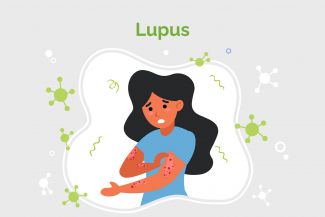
Although the exact cause of lupus and other autoimmune diseases is unknown, most believe that lupus results from both genetic and environmental stimuli. Since lupus is known to occur within families, doctors believe that it is possible to inherit a genetic predisposition to lupus. It is probable that having an inherited predisposition for lupus makes the disease more likely only after coming into contact with some environmental trigger.
The higher number of lupus cases in females than in males may indicate that the disease can be triggered by certain hormones. Physicians believe that hormones such as oestrogen regulate the progression of the disease because symptoms tend to flare before menstrual periods and/or during pregnancy.
Certain environmental factors have been known to cause lupus symptoms. These include:
- Extreme stress
- Exposure to ultraviolet light, usually from sunlight
- Smoking
- Some medications and antibiotics, especially those in the sulfa and penicillin groups
- Some infections, such as cytomegalovirus (CMV), parvovirus (such as fifth disease), hepatitis C infections, and the Epstein-Barr virus (in children)
- Chemical exposure to compounds such as trichloroethylene in well water and dust
- Air pollution











